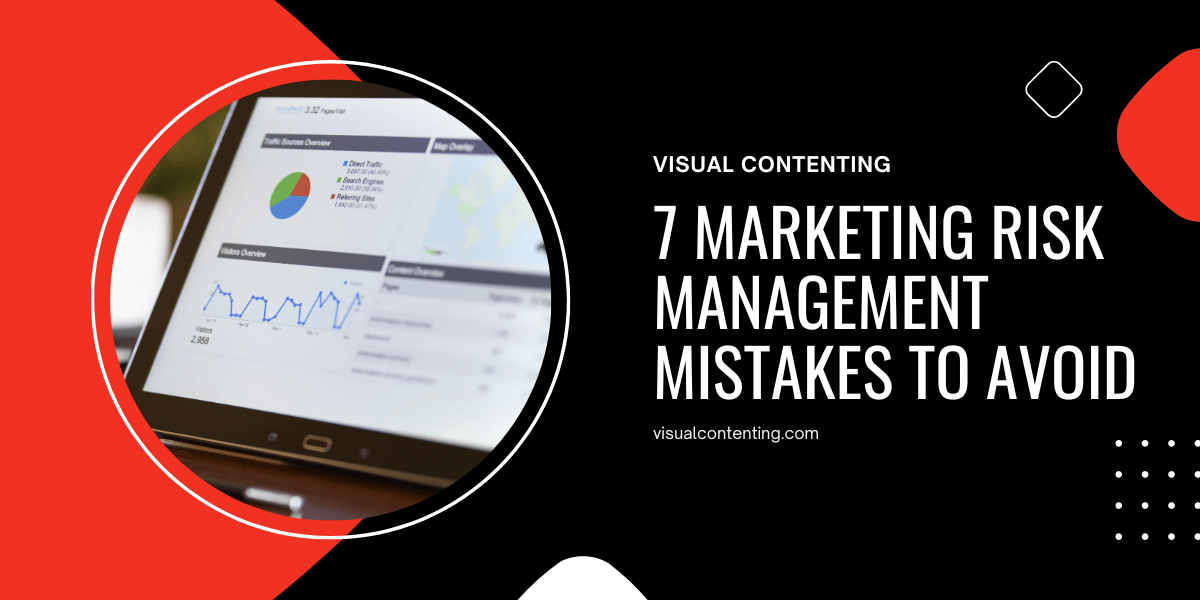Imagine a marketing professional about to launch a new campaign. They've devoted countless hours to planning, strategizing and envisioning its success. However, have they considered the potential risks that could undermine their efforts?
Marketing risk management is crucial to any campaign strategy, and recognizing its significance could lead to favorable outcomes. Marketers are no strangers to the constant challenges in their industry. It's their job to navigate these waters skillfully, but sometimes, even the most seasoned professionals encounter unexpected pitfalls.
That's why it's essential to identify and address these risks head-on to optimize marketing strategies. Here are the top marketing risk management mistakes and the best practices for avoiding these common blunders.
1. Inadequate Budgeting and Resource Allocation
Several problems can arise if budgets or resources are not allocated effectively. Insufficient tools and funding can hamper marketing campaign execution, reducing its impact and effectiveness. In fact, 64.2% of U.S. marketers cite limited budgets as the primary barrier to personalization. This results in undesirable outcomes and causes teams to spend even more money determining how to execute their campaigns more efficiently.
This may cause marketers to scramble to meet targets within an adequate time frame, leading to increased stress and burnout. An overload of tasks may occur, causing them to feel overwhelmed and affecting their overall productivity and performance.
Consider establishing clear objectives to ensure effective budgeting and resource allocation. What does the marketing leader want to achieve with these strategies? Identify the goals and prepare a budget for the team to implement their campaigns successfully.
Developing a detailed budget plan also helps. Create a comprehensive plan outlining the costs associated with each marketing activity, ensuring transparency and accountability in resource allocation.
2. Neglecting to Identify and Prioritize Risks
Various reasons lead marketers to neglect risk identification and prioritization. They may feel overly confident about their strategies, relying on their experience and intuition to navigate potential risks. However, this mindset may cause them to overlook the importance of a systematic risk identification process.
Another reason could be a need for more awareness. Marketers may not fully understand the significance of risk management or may lack the necessary skills or knowledge to identify and prioritize risks effectively.
Risk identification is vital because it aids in decision-making. Identifying risks allows marketers to make better decisions and consider potential mistakes that could impact campaign results.
Implementing a risk management system can be highly beneficial in this regard. It will help identify, assess and track potential risks, enabling marketers to make informed decisions and allocate resources more effectively.
Recognizing the importance of risk identification, utilizing a risk management system and implementing strategies for prioritization lets marketers better manage potential challenges and enhance the overall success of their campaigns.
3. Overlooking the Impact of Competitors
Competition is crucial in marketing risk management, as it directly affects market share, positioning and response to innovations. Marketers must understand their competitors and give them more attention. They should monitor their activities to stay ahead.
Useful strategies include conducting regular competitor analysis to stay updated on their offerings, pricing, marketing strategies and market positioning. Social listening tools help monitor competitors' online presence and engagement. Attending industry events and trade shows allows professionals to gain insights into competitors' activities and new market developments.
Performing a periodic SWOT analysis is also crucial. This allows marketers to compare their company with competitors and identify growth opportunities. Having a contingency plan in place can help address competitive threats effectively.
4. Failing to Adapt to Changing Market Conditions
Markets constantly evolve, and failing to adapt to changing conditions can spell trouble for even the most established businesses. Companies that ignore the need to keep up with the times risk losing their competitive edge and falling behind.
Consider how technology has transformed how people shop, communicate and consume information. Companies that didn't embrace these changes found themselves struggling to remain relevant. Similarly, shifting consumer preferences and emerging trends can make or break a business. Therefore, staying in tune with what's happening in the market is crucial for staying ahead.
How can businesses achieve this? Staying informed about the latest trends in the market helps them spot changes early on. Embracing a culture of innovation and being open to experimentation with new strategies are also essential. Staying informed and adaptive helps marketers be ready for whatever changes come their way.
5. Inadequate Diversification of Marketing Channels
Marketers relying on a single channel expose themselves to several risks and potential issues. For one, this restricts their ability to reach a broader audience, limiting the overall impact of marketing efforts and causing them to miss out on valuable customer segments.
Overdependence on a single channel also leaves them vulnerable to disruptions. Being on only one can be problematic if there are technical issues, algorithm changes or policy updates, resulting in a significant negative impact on the marketing campaign.
Marketers should consider diversifying their channels to mitigate these risks. Diversification involves taking a multichannel approach, employing a combination of platforms, such as social media, email and content marketing, to reach a wider audience and cater to different customer preferences.
Diversification can improve marketing risk management and maximize the reach and effectiveness of campaigns.
6. Ineffective Communication and Collaboration Within the Marketing Team
Poor communication often occurs when marketing teams aren't aligned with each other. This typically stems from a lack of clarity, where team members may need help understanding what is expected of them. Consequently, this can lead to misaligned goals, inefficiencies and inconsistencies across all strategies and tactics.
On the other hand, effective communication results in efficient decision-making. Team members with the context needed to make informed decisions reduce errors and take advantage of opportunities.
Marketers should consider establishing clear goals and objectives to foster better collaboration. They should ensure all team members understand the overarching goals of a marketing campaign and how their tasks contribute to achieving them.
Finally, marketers should conduct regular meetings and share updates. They should discuss progress on a particular project and address any challenges or risks that may have emerged. Team members can use tools to share ideas and organize their tasks, helping them better understand what's happening and create strategies to tackle challenges effectively.
7. Insufficient Market Research
Marketers know the importance of research, as it provides the critical information needed to launch campaigns that resonate with potential customers. However, some marketers may find this area challenging because they need help figuring out where to start or have limited resources.
Not conducting market research can result in poor targeting, lost opportunities to capitalize on emerging trends, and strategy implementation that doesn't align with customer needs. This leads to a higher risk of failure because decisions based on limited or incorrect information prevent marketers from establishing a fully developed targeting strategy.
Marketers who want to ensure thorough market research should consider conducting surveys. They can collect valuable customer data about their needs and opinions of the company. That feedback gives the marketing team an outline for improvement and tactics to implement.
Data is also crucial, as it provides insightful information for targeting customers. Marketers should use data analytics tools to analyze customer behavior and identify trends and potential areas of improvement.
Steering Clear of Marketing Risk Management Pitfalls
Avoiding marketing risk management mistakes is crucial for the success of any campaign. However, marketers must recognize their potential pitfalls and create a robust prevention plan.
Actively identifying potential risks lets marketing managers address them and significantly improve the overall campaign performance to achieve better outcomes. Implementing these strategies and staying vigilant allows marketers to confidently navigate the ever-changing landscape — leading to more successful campaigns and a stronger brand presence.
Related Posts
Devin Partida writes about topics concerning tech and the internet. She is also the Editor-in-Chief of ReHack.com.







